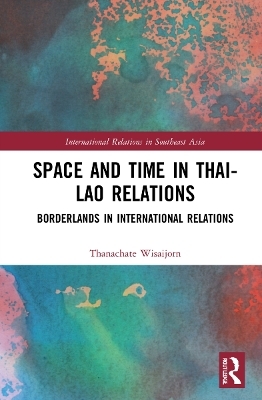
Space and Time in Thai-Lao Relations
Borderlands in International Relations
Seiten
2024
Routledge (Verlag)
978-1-032-19137-9 (ISBN)
Routledge (Verlag)
978-1-032-19137-9 (ISBN)
Wisaijorn explores how the concepts of space and temporality in traditional geopolitics have influenced the understanding of the Thai-Lao border since Laos became independent in 1954.
Arguing that a state-centric conceptualisation of the Thailand-Laos border falls into both a territorial and temporal trap, Wisaijorn contests that privileging a theoretical border silences the voices of people on the ground. In doing so, he expands the concept of a temporal trap with the addition of a temporal dimension – analysing how the state claims a monopoly not only on a geography, but also a history. Rooted in orientalism, colonialism and the expediencies of the Cold War, the border operates in the interest of elites and ignores the lived reality of peoples on the ground. By bringing these voices back into the discussion, Wisaijorn presents a more complex framework, which reveals a human dimension missing not only from this particular case, but more broadly from the conceptions of borders within International Relations theory.
A fascinating case study for scholars with an interest in mainland Southeast Asia, which also makes a valuable theoretical contribution to International relations discourse.
Arguing that a state-centric conceptualisation of the Thailand-Laos border falls into both a territorial and temporal trap, Wisaijorn contests that privileging a theoretical border silences the voices of people on the ground. In doing so, he expands the concept of a temporal trap with the addition of a temporal dimension – analysing how the state claims a monopoly not only on a geography, but also a history. Rooted in orientalism, colonialism and the expediencies of the Cold War, the border operates in the interest of elites and ignores the lived reality of peoples on the ground. By bringing these voices back into the discussion, Wisaijorn presents a more complex framework, which reveals a human dimension missing not only from this particular case, but more broadly from the conceptions of borders within International Relations theory.
A fascinating case study for scholars with an interest in mainland Southeast Asia, which also makes a valuable theoretical contribution to International relations discourse.
Thanachate Wisaijorn is a lecturer in politics and International Relations at the Faculty of Political Science, Ubon Ratchathani University. He has a PhD in International Relations from Loughborough University, United Kingdom.
Acknowledgements
1 Introduction
2 Territorial traps in International Relations: The Thai-Lao relations from 1954 to the present
3 Temporal traps in International Relations: Thai-Lao relations from 1954 to the present
4 Human dimension in the Thai-Lao relations as challenges from government, geography, sociology, and anthropology to International Relations
5 Borderland Studies: Post-geopolitics of space and time
6 Conclusion
Index
| Erscheinungsdatum | 03.05.2022 |
|---|---|
| Reihe/Serie | International Relations in Southeast Asia |
| Verlagsort | London |
| Sprache | englisch |
| Maße | 156 x 234 mm |
| Gewicht | 453 g |
| Themenwelt | Naturwissenschaften ► Geowissenschaften ► Geografie / Kartografie |
| Sozialwissenschaften ► Politik / Verwaltung ► Europäische / Internationale Politik | |
| Sozialwissenschaften ► Soziologie ► Makrosoziologie | |
| Sozialwissenschaften ► Soziologie ► Spezielle Soziologien | |
| ISBN-10 | 1-032-19137-6 / 1032191376 |
| ISBN-13 | 978-1-032-19137-9 / 9781032191379 |
| Zustand | Neuware |
| Informationen gemäß Produktsicherheitsverordnung (GPSR) | |
| Haben Sie eine Frage zum Produkt? |
Mehr entdecken
aus dem Bereich
aus dem Bereich
über eine faszinierende Welt zwischen Wasser und Land und warum sie …
Buch | Hardcover (2023)
dtv (Verlag)
24,00 €
Eine Einführung in die spezielle Mineralogie, Petrologie und …
Buch | Hardcover (2022)
Springer Spektrum (Verlag)
59,99 €


